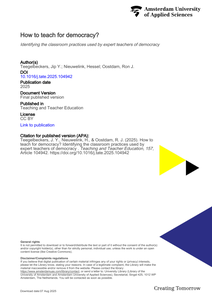To stimulate democratic competences through teaching, it is necessary to have an understanding of actions and behaviors that are considered effective in teaching methods. In this study, we investigated these actions and behaviors, referred to as classroom practices, by interviewing 20 expert teachers of democracy in the Netherlands. We identified six relevant practices: meaningful embedding, providing multiple perspectives, thinking about solutions from divergent perspectives, independent information collection and presentation, taking socio-political action, and critical reflection on subject matter. We show how these practices are associated with democratic competences and provide examples of how the practices are implemented in teaching methods.
DOCUMENT

The paper arguments that a design approach will be essential to the future of e-democracy and e-governance. This development is driven at the intersection of three fields: democracy, information technology and design. Developments in these fields will result in a new scale, new complexity and demands for new quality of democracy solutions. Design is essential to answer these new challenges. The article identifies a new generation of design thinking as a distinct new voice in the development of e-democracy and describes some of the consequences for democracy and governance. It argues that, to be able to design new solutions for e-democracy successfully, current approaches may be too narrow and a broader critical reflection is necessary for both designers and other stakeholders in the process.
DOCUMENT
